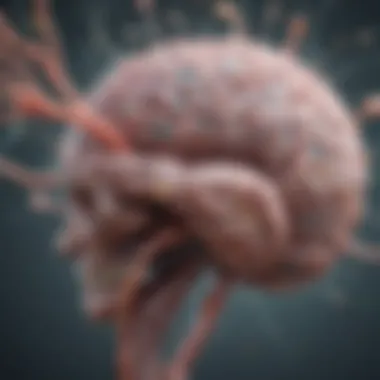Understanding Antidepressant Ineffectiveness: Key Factors


Intro
The efficacy of antidepressants is a topic that garners much debate. Many people expect them to alleviate symptoms of depression, but the reality is more complex. Understanding why antidepressants do not work for everyone involves diving into a landscape that intertwines biological, psychological, and social factors. This article explores these dimensions, shedding light on why some individuals may feel disheartened despite their medication regimen.
Key Research Findings
Overview of Recent Discoveries
Recent studies have shown varying effectiveness of antidepressants on different groups of individuals. One significant finding indicates that genetic factors can greatly influence how a person metabolizes these medications. The presence of specific genetic variations can impact drug efficacy and tolerability. For instance, individuals with different forms of the CYP450 gene may process medications at different rates, leading to variations in response.
Moreover, research suggests that prior mental health history plays a crucial role in the effectiveness of antidepressants. Individuals with long-standing depression may find less relief than those in the early stages of the disorder. This implies that chronic conditions may require a different treatment approach altogether.
Significance of Findings in the Field
The relevance of these discoveries cannot be overstated. Recognizing that antidepressant response is not uniform prompts a need for personalized treatment plans. Instead of a one-size-fits-all approach, medical professionals can tailor their strategies based on individual genetic profiles and medical histories. This paradigm shift in mental health care is essential for improving outcomes.
"The effectiveness of antidepressants depends significantly on an individual's unique biological makeup and life history."
Breakdown of Complex Concepts
Simplification of Advanced Theories
To comprehend why antidepressants may not work, one must consider several interrelated concepts. Neurotransmitter theory has historically guided antidepressant prescriptions. This theory posits that a deficiency in neurotransmitters like serotonin and norepinephrine leads to depressive symptoms. However, this simplistic notion does not account for the full complexity of mental health issues.
Recent frameworks have introduced neuroinflammation and neuroendocrine factors as vital components. Inflammation in the brain can affect mood regulation, and hormonal imbalances may further complicate treatment outcomes.
Visual Aids and Infographics
Accompanying this narrative with visual aids can be beneficial. Infographics detailing how neurotransmitters work and how they interact with various antidepressants can simplify these concepts. Flowcharts illustrating the pathways of drug metabolism via the CYP450 system may help clarify the scientific background for those interested.
In summary, the reasons why antidepressants do not work for everyone are multifaceted and deeply rooted in both biology and individual experiences. By considering genetic factors, mental health history, and advances in our understanding of depression's complexities, we can forge a healthier discussion around mental health treatments.
Understanding Antidepressants
Understanding antidepressants is crucial in comprehending why some individuals struggle to find relief with these medications. This section serves to elucidate key elements surrounding antidepressants. It details what they are, their types, and how they function. Having a comprehensive grasp of these elements enables individuals to approach their treatment from an informed perspective. Such knowledge can foster better discussions with healthcare professionals regarding possible treatments, ultimately contributing to more tailored and effective care strategies.
What are Antidepressants?
Antidepressants are a class of medications designed to alleviate symptoms of depression. They accomplish this by influencing the levels of various neurotransmitters in the brain, which are chemicals that transmit signals between nerve cells. The primary goal is to restore the balance of these neurotransmitters, potentially enhancing mood and overall mental health. While the name suggests a singular purpose, antidepressants can serve various roles, including the management of anxiety disorders, obsessive-compulsive disorder, and certain chronic pain conditions.
Types of Antidepressants
Different types of antidepressants are available, each with its own mechanism of action and potential effects. The primary classifications include:
- Selective serotonin reuptake inhibitors (SSRIs): These drugs, such as fluoxetine and sertraline, increase serotonin availability by blocking its reabsorption in the brain. This class is often the first choice for treating depression due to relatively mild side effects.
- Serotonin-norepinephrine reuptake inhibitors (SNRIs): Medications like venlafaxine combine effects on serotonin and norepinephrine, aiming to address symptoms through both neurochemical pathways.
- Tricyclic antidepressants (TCAs): Though less common today, agents such as amitriptyline are effective but can lead to more side effects, making them secondary options.
- Monoamine oxidase inhibitors (MAOIs): This older class, including phenelzine, requires dietary restrictions due to the risk of severe interactions, but they can be effective for treatment-resistant cases.
Understanding the distinctions among these types can aid individuals in recognizing which medication class may be more appropriate for their particular situation.
Mechanisms of Action
Each type of antidepressant operates through different mechanisms to improve mood and mental function.
- SSRIs primarily increase serotonin levels by inhibiting its reuptake in the brain, promoting a more stable mood.
- SNRIs similarly target both serotonin and norepinephrine, potentially addressing a broader range of symptoms by enhancing neurotransmitter activity.
- TCAs block the reuptake of various neurotransmitters and also affect certain receptors, which can contribute to their efficacy, albeit with a higher likelihood of side effects.
- MAOIs inhibit the action of monoamine oxidase, an enzyme responsible for breaking down neurotransmitters, thereby increasing their availability and effectiveness.
Understanding these mechanisms paves the way for a more informed discussion about depression treatment, playing a crucial role in the overall mental health strategy.
"Knowledge about the pharmacology of antidepressants is essential for patients to engage actively in their treatment journey."


By grasping these fundamental aspects, individuals can better navigate their mental health care, exploring options that align more with their unique biochemical makeup and personal experiences.
Individual Variability in Treatment Response
Understanding how different individuals respond to antidepressants is central to grasping why these medications often fail to alleviate symptoms for some. The variability in treatment response is informed by a host of factors that interact in complex ways. Each person's unique biological makeup, psychological state, and social circumstances contribute to the effectiveness of antidepressants. Addressing this section helps in acknowledging that not all patients will experience relief from their symptoms in the same manner, which underscores the need for personalized treatment strategies.
Genetic Factors
Genetic variation plays a crucial role in how individuals metabolize antidepressants. Specific genes, such as those involved in drug metabolism, can affect the concentration of medication in the bloodstream. For example, variations in the CYP450 gene family may lead to fast or slow metabolism of drugs like fluoxetine or sertraline. Knowing one's genetic profile may help predict the efficacy of a particular antidepressant and reduce the trial-and-error approach often associated with treatment.
Biochemical Markers
Biochemical markers, including neurotransmitter levels and inflammatory markers, can shed light on why some people do not respond well to antidepressants. Neurotransmitters like serotonin, norepinephrine, and dopamine are essential in mood regulation. If these systems are dysregulated, it may hinder the effectiveness of standard antidepressant therapies. Moreover, emerging research indicates that inflammation in the brain may correlate with depression and could influence how well a person responds to medication. Identifying these markers may pave the way for more tailored therapeutic approaches.
Comorbid Conditions
Comorbid conditions, such as anxiety disorders or chronic illnesses, can complicate the treatment of depression. These conditions not only affect an individual’s overall mental health but also impact how they respond to antidepressants. The presence of additional psychological or physical health issues may necessitate a different treatment plan or combination of medications. It is essential for healthcare providers to consider these when evaluating treatment options, as managing comorbidities can significantly enhance the effectiveness of antidepressants.
"Understanding the intricate relationships between comorbid conditions and antidepressant effectiveness can lead to better patient outcomes."
In summary, individual variability in treatment response to antidepressants underscores the importance of personalized medicine in mental health care. By examining genetic factors, biochemical markers, and comorbid conditions, clinicians can better tailor treatments that fit the needs of each patient.
Psychological Factors
Understanding psychological factors is crucial in comprehending why antidepressants might not provide the desired relief for some individuals. These factors encompass an individual's mental health history, their coping mechanisms, and their expectations and beliefs regarding treatment. Each of these elements can substantially influence how one responds to medication. By examining psychological factors, we can gain insight into the interplay between mental states and pharmacological intervention, ultimately aiming for a more personalized approach to mental health care.
Mental Health History
One's mental health history plays a significant role in determining treatment efficacy. A person with a long-standing history of depression or anxiety may have experienced various forms of treatment, including therapy, lifestyle changes, or medications. The cumulative impact of past experiences with mental health treatment can shape an individual's expectations and reactions to new interventions. For instance, if a patient has previously faced multiple treatment failures, they may subconsciously anticipate similar outcomes when starting antidepressants, which can hinder the effectiveness of the medication. It is vital for healthcare providers to consider this history when prescribing treatment.
Coping Mechanisms
Another vital aspect is coping mechanisms. These strategies vary widely among individuals and can significantly affect how one deals with stress, depression, or anxiety. For example, a person who relies on healthy coping mechanisms, such as exercise or mindfulness, may experience better overall mental health and find medications more effective. Conversely, individuals who resort to unhealthy strategies, such as substance abuse or avoidance, may not benefit as much from medication. The dynamics of coping are complex and deeply intertwined with one's psychological state, reflecting both resilience and vulnerability.
Expectations and Beliefs
Lastly, expectations and beliefs about antidepressants can drastically influence their effectiveness. If a patient holds a negative belief regarding the utility of antidepressants, this bias can manifest in reduced effectiveness. The placebo effect can often demonstrate how expectations can lead to real changes in mental and physical health. Positive expectations can enhance the perceived efficacy of treatment. Therefore, addressing and reshaping these beliefs through education and therapy can be fundamental in reaching treatment goals.
"Being aware of how mental health history, coping strategies, and personal beliefs shape treatment outcomes is paramount for both patients and providers in the quest for effective interventions."
Addressing psychological factors not only promotes a deeper understanding of treatment effectiveness but also fosters a more compassionate approach towards individuals struggling with mental health issues. This understanding can lead to personalized treatment plans that are more aligned with the individual's unique needs and experiences.
Environmental Influences
Environmental influences play a significant role in the overall effectiveness of antidepressant treatments. Recognizing how external factors affect an individual's mental health can shed light on why some may not experience the anticipated improvement from medication. Environmental factors encompass a wide range of elements, including life stressors, social support systems, and socioeconomic conditions.
Stressful Life Events
Stressful life events can significantly impact how a person responds to antidepressants. Events such as the loss of a loved one, job loss, or trauma can create emotional upheaval that may interfere with treatment efficacy. The emotional state resulting from these situations can alter one’s neurochemistry, potentially counteracting the benefits of the medication.
Moreover, these events may lead to ruminative thoughts, reducing the individual’s ability to manage mental health conditions. It's crucial to engage with mental health professionals during such times. They can tailor treatment approaches that consider these external stressors and help in building effective coping strategies, whether through medication or therapy.
Social Support Networks
Social support networks can also influence therapeutic outcomes. A supportive environment can help an individual to make better progress with their treatment. When friends or family provide emotional support, it may reduce feelings of isolation or hopelessness. In contrast, a lack of support can create feelings of loneliness, which might worsen depressive symptoms.
Investing time in building a solid social network can help enhance resilience and give people the motivation they need to communicate openly about their struggles. The interactions within these networks often reinforce the perception of support and can be a fundamental factor in recovery.
Socioeconomic Factors


Socioeconomic factors represent another layer of complexity in the effectiveness of antidepressant medication. Individuals facing economic hardships may experience compounded stress that medication alone may not address. Access to healthcare, including mental health services, often correlates with income level. Those in lower socioeconomic statuses may have limited access to quality healthcare, which can hinder the possibility of effective treatment plans.
Furthermore, socioeconomic conditions can shape one’s living environment, educational opportunities, and overall outlook on life, all of which affect mental health. Recognizing the impact of these factors is essential for clinicians as they work to develop personalized treatment strategies and support systems for their patients.
Understanding these environmental influences can empower individuals to seek the right support and treatment tailored to their specific circumstances.
Adherence to Treatment
The concept of adherence to treatment is critical in understanding why antidepressants may not work for everyone. Adherence, in this context, refers to whether patients take their prescribed medication as directed, including the correct dosage and frequency. When individuals don’t adhere faithfully to their treatment regimen, the effectiveness of antidepressants can be severely compromised.
Understanding the Importance of Adherence
Adherence plays a vital role in the overall success of antidepressant treatment. Studies show that consistent use can lead to better patient outcomes. Factors such as maintaining the appropriate dosage and timing can influence how well the medication works.
- Therapeutic Effect: Medications require time to build up in the body. Missing doses can disrupt this process, reducing the medicine's therapeutic effect.
- Mood Stability: Regular intake helps stabilize mood and can prevent relapses in depressive symptoms.
- Trust in Treatment: Keeping to a regimen helps develop trust in the treatment process. If patients feel better as a result of consistent use, their confidence in the medication increases.
Barriers to Consistent Use
Adherence does not come without its challenges. Various barriers can hinder consistent use of antidepressants, resulting in lower success rates. Some of these barriers include:
- Side Effects: Many patients experience side effects that may deter them from taking medication. Common side effects, such as nausea or fatigue, can lead to discontinuation of use.
- Forgetting: Simple forgetfulness is another reason for inconsistent use. Busy lifestyles often result in missed doses.
- Misunderstanding of Treatment: Patients might not fully understand the importance of continuing the medication even when they feel better. Some may stop taking the medication due to the misconception that they have fully recovered.
Strategies for Improved Adherence
Improving adherence can significantly impact the success of antidepressant treatments. Here are some strategies:
- Education: Providing clear information about how antidepressants work and the importance of consistent use can help patients understand the treatment process and make more informed decisions.
- Setting Reminders: Utilizing smartphone apps or alarm systems can help remind patients when to take their medication.
- Support Networks: Encouraging family or friends to support medication adherence can create a reliable support system.
- Regular Follow-ups: Regular visits to healthcare providers can serve as check-ins. They can discuss concerns and adjust treatment plans if necessary.
By focusing on adherence to treatment, individuals can potentially enhance the effectiveness of their antidepressants. This leads to improved mental health outcomes.
Evaluating Treatment Efficacy
Understanding how to evaluate the efficacy of antidepressant treatment is central to ensuring optimal patient care. It is not sufficient to simply prescribe medication; healthcare providers must continuously assess its effectiveness. This involves closely monitoring clinical outcomes and considering the holistic picture of the patient's life. Without careful evaluation, patients may remain on ineffective medications, prolonging their suffering.
Measuring Outcomes
Measuring outcomes is vital in assessing treatment efficacy. Health professionals often rely on standardized scales to quantify symptoms of depression, such as the Hamilton Rating Scale for Depression or the Beck Depression Inventory. These tools provide a baseline measurement and help track changes over time.
Additionally, patient feedback is crucial. Patients should regularly discuss their experiences regarding symptom relief and side effects. This subjective data, paired with objective evaluation tools, creates a comprehensive view of how well the antidepressant is working. The goal is to achieve meaningful improvements in daily functioning and overall well-being.
When to Reassess Treatment
Determining when to reassess treatment is a complex task that depends on various factors. Generally, healthcare providers recommend a follow-up at six to eight weeks after starting an antidepressant. This period allows enough time for the medication to take effect, as some drugs require gradual buildup before leading to observable changes.
If a patient reports no improvement in symptoms or expresses concerns about side effects, it may be necessary to revisit the treatment plan sooner. Continuous evaluation ensures that interventions remain relevant and effective. It is essential for patients to feel empowered to speak up about their experience.
Seeking Alternative Therapies
When traditional antidepressant treatments fail, exploring alternative therapies becomes a priority. There are many avenues to consider, such as:
- Psychotherapy: Different therapeutic approaches, including cognitive-behavioral therapy or dialectical behavior therapy, may combine effectively with medication.
- Lifestyle Changes: Exercise, diet, and sleep may significantly impact mental health. Patients should consider a holistic approach that encompasses these factors.
- Complementary Treatments: Practices like acupuncture, mindfulness, or yoga can bridge the gap left by antidepressants, providing additional benefits.
"The exploration of alternative therapies can offer promising avenues for those who find no relief from standard treatments."
While exploring alternatives, it is important to maintain an open dialogue with healthcare providers. This collaborative approach enables the creation of a personalized treatment strategy that takes into account the patient's unique needs and circumstances.
The Role of Psychotherapy


Psychotherapy plays a critical role in treating depression, particularly for individuals who find no relief from antidepressants alone. Combining therapy with medication creates a more comprehensive treatment plan, addressing both the psychological and biological aspects of depression. Understanding this dynamic is crucial for individuals seeking effective solutions to their mental health challenges.
Combining Therapy with Medication
The synergy between therapy and medication is essential for many people. While antidepressants target neurotransmitter imbalances, psychotherapeutic approaches help address emotional and cognitive patterns associated with depression. This combined approach often leads to more significant improvements in well-being.
Several studies suggest that individuals receiving combined treatment often report better outcomes than those relying solely on medication. Therapy can include cognitive behavioral techniques, which help patients recognize and reframe negative thought patterns, thus enhancing their response to medication.
When a person learns effective coping strategies through therapy, they may notice an improvement in their ability to manage symptoms during and after medication treatment. The motivation derived from therapy can also support adherence to medication regimens, further contributing to better overall outcomes.
Types of Psychotherapy Approaches
There are various psychotherapy approaches that can be beneficial when combined with medication. Some of the most common methodologies include:
- Cognitive Behavioral Therapy (CBT): Focuses on altering negative thought processes contributing to feelings of depression.
- Interpersonal Therapy (IPT): Concentrates on improving interpersonal relationships and communication styles, which may influence depressive symptoms.
- Dialectical Behavior Therapy (DBT): Balances the acceptance of difficult emotions while also encouraging behaviors to create change, very useful in managing crisis situations.
- Psychodynamic Therapy: Encourages exploration of the unconscious mind and past experiences to understand the root causes of depression.
Each of these approaches offers unique insights and techniques to address mental health issues, allowing individuals to choose one that aligns with their specific situation and needs.
Evidence Supporting Combined Treatments
Research continuously supports the effectiveness of combining psychotherapy with medication. For example, meta-analyses consistently show that integrated treatment plans lead to faster recovery and lower rates of relapse compared to pharmacotherapy alone.
"Combining psychotherapy with medication allows for a more holistic approach to treating depression."
Furthermore, recent studies indicate that combined treatments not only improve symptoms but also enhance quality of life, helping individuals regain functionality in their daily routines. As awareness grows regarding mental health, the push for comprehensive treatment solutions continues to gain traction among healthcare providers.
In summary, the role of psychotherapy in treating depression is significant and cannot be overlooked. By recognizing how therapy complements medication, individuals can more effectively navigate their paths toward mental wellness.
Potential Side Effects
Understanding the potential side effects of antidepressants is crucial in grasping why some individuals may not find these medications effective. Side effects can vary widely among different antidepressant classes, and their impact on a person's daily life can often be significant. Patients may weigh the benefits against these potential drawbacks, leading some to discontinue their treatment. This understanding informs patients and healthcare providers about what to expect and helps mitigate the discomfort that can arise from these treatments.
Common Side Effects
Common side effects associated with antidepressants can range from minor to more severe. Some of these side effects include:
- Nausea
- Dizziness
- Weight gain
- Sleep disturbances
- Dry mouth
- Fatigue
- Sexual dysfunction
Each of these effects can change an individual’s perception of the drug’s overall efficacy. For instance, sexual dysfunction can be particularly distressing and may lead to a loss of adherence to the medication. Individuals might associate the unpleasant side effects with the medication's effectiveness, causing them to feel depressed about their treatment options.
Impact on Medication Adherence
Side effects can substantially impact an individual’s willingness to adhere to prescribed medication regimens. When individuals experience discomfort or distress from side effects, they may skip doses or stop taking the medication altogether. This non-adherence can result in incomplete treatment, ultimately affecting their mental health outcomes.
- Increased Discomfort: Patients often prioritize comfort. If side effects are pronounced, the desire to feel normal often takes precedence over the perceived benefits of the medication.
- Mental Strain: Persistent side effects can lead to increased anxiety or frustration, undermining the intended purpose of antidepressant therapy.
The relationship between side effects and adherence is complex, making it necessary for healthcare providers to monitor and address these issues proactively. Regular follow-ups and open communication can create a more favorable environment for discussing any distressing side effects.
Dealing with Side Effects
Managing side effects is essential for maintaining adherence to antidepressant treatment. Here are several strategies that individuals can employ:
- Open Communication with Healthcare Providers: Discuss any side effects with a doctor promptly. Some side effects can be managed or mitigated through alternative medications or dosage adjustments.
- Lifestyle Adjustments: Incorporating a healthy lifestyle—such as regular exercise, a balanced diet, and sufficient sleep—can reduce some side effects.
- Consider Counseling: Psychotherapy can provide coping strategies to manage any emotional or psychological distress that arises from side effects.
"Understanding the side effects is as important as knowing the possible benefits. Awareness encourages better management and improves treatment adherence."
In summary, recognizing potential side effects of antidepressants not only sheds light on the medication's limitations but also empowers patients to engage actively in their treatment plan. By addressing these challenges, individuals can better navigate their journey toward mental health recovery.
The Quest for Personalized Medicine
The exploration of personalized medicine represents a pivotal moment in the field of mental health, particularly concerning antidepressant therapies. This approach seeks to tailor medical treatment to the individual characteristics of each patient. It recognizes that a one-size-fits-all strategy may be ineffective for many. Addressing the unique biological, psychological, and environmental factors that influence how a person responds to antidepressants can lead to more effective treatment plans.
Personalized medicine offers numerous benefits. First, it can improve treatment efficacy. By understanding the specific needs and genetic makeup of a patient, healthcare providers can select medications that are more likely to work effectively. Second, this approach can minimize side effects. Suitable medications, identified through genetic testing, may lower the chances of adverse reactions that often accompany antidepressant use. Lastly, it encourages a more engaged patient-provider relationship. Patients who see that their treatment is tailored to them are often more invested in their health.
However, there are considerations. The field of personalized medicine is still developing. Advancements in research are necessary to streamline how genetic and biological indicators are translated into clinical practice. Additionally, economic factors can limit access to such tailored treatments. Not all patients have the resources or insurance coverage to utilize these advanced diagnostic methods. Hence, while personalized medicine presents a promising frontier, challenges remain that need addressing.















